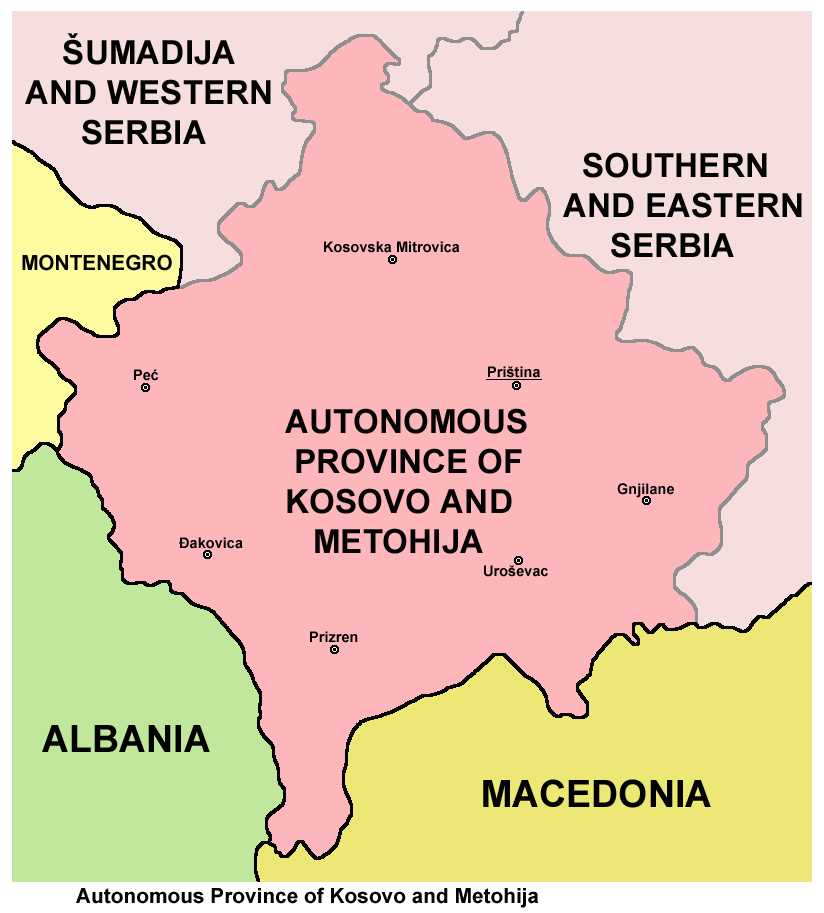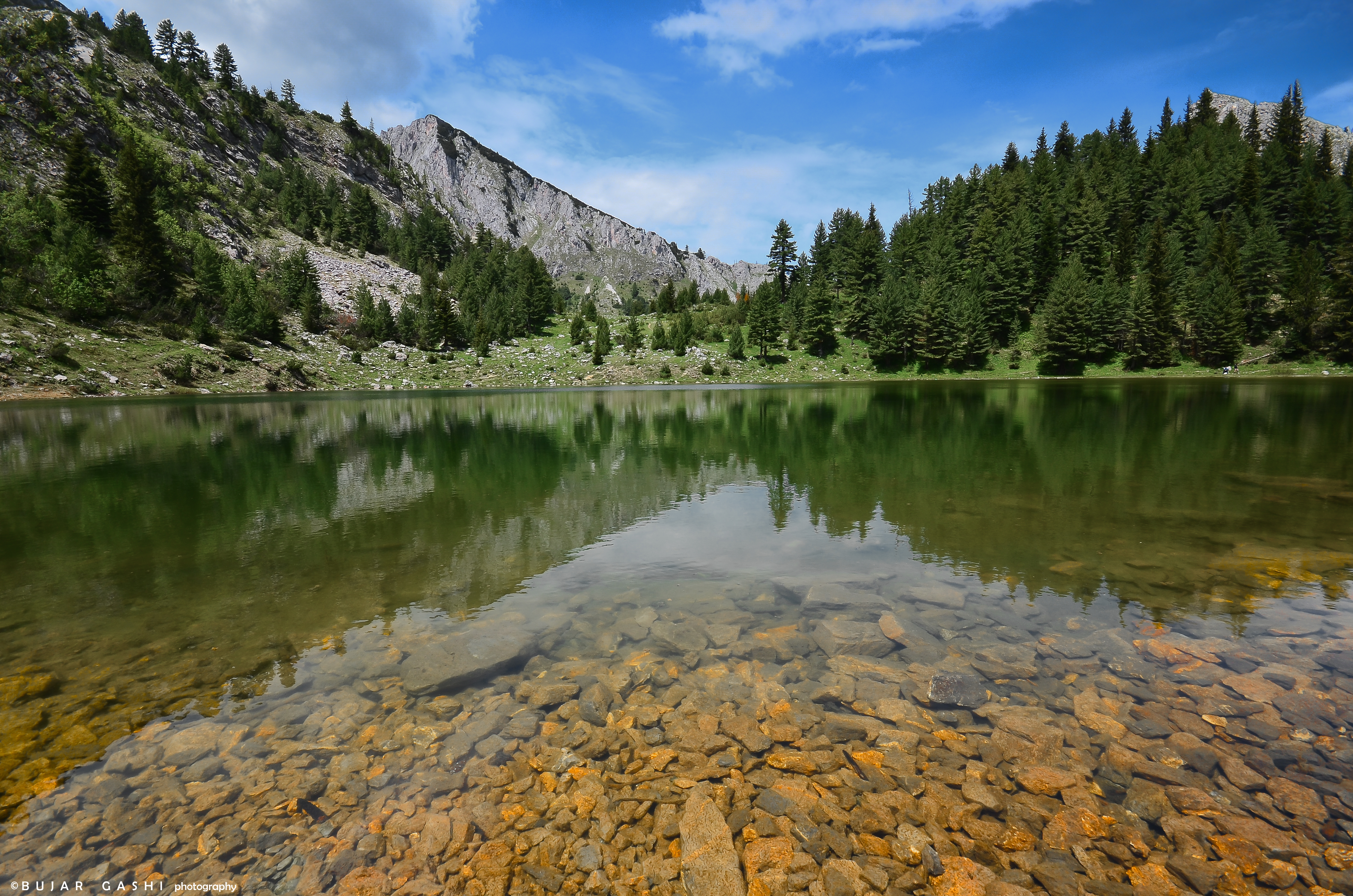|
Province Of Kosovo And Metohija
The Autonomous Province of Kosovo and Metohija ( sr, Косово и Метохиja, Kosovo i Metohija; sq, Kosova dhe Metohija), commonly known as Kosovo and abbreviated to Kosmet or KiM, is an autonomous province defined by the constitution of Serbia that occupies the southernmost part of Serbia. The territory is the subject of an ongoing political and territorial dispute between Serbia and the partially recognised, self-proclaimed Republic of Kosovo, the latter of which has control over the region. Its claimed administrative capital and largest city is Pristina. The territory of the province, as recognized by Serbian laws, lies in the southern part of Serbia and covers the regions of Kosovo and Metohija. The capital of the province is Pristina. The territory was previously an autonomous province of Serbia during Socialist Yugoslavia (1946–1990), and acquired its current status in 1990. The province was governed as part of Serbia until the Kosovo War (1998–99), when i ... [...More Info...] [...Related Items...] OR: [Wikipedia] [Google] [Baidu] |
Administrative Divisions Of Serbia
The administrative divisions of Serbia ( sr, административна подела Србије, аdministrativna podela Srbije) are regulated by the Government of Serbia ''Enactment'' of 29 January 1992,Government of SerbiaDistricts In Serbia/ref> and by the Law on Territorial Organization adopted by the National Assembly of Serbia on 29 December 2007.Law on Territorial Organization and Local Self-Government , Parliament of Serbia is divided into 29 districts by the government decree issued in 1992. The units of the territorial ... [...More Info...] [...Related Items...] OR: [Wikipedia] [Google] [Baidu] |
Central European Time
Central European Time (CET) is a standard time which is 1 hour ahead of Coordinated Universal Time (UTC). The time offset from UTC can be written as UTC+01:00. It is used in most parts of Europe and in a few North African countries. CET is also known as Middle European Time (MET, German: MEZ) and by colloquial names such as Amsterdam Time, Berlin Time, Brussels Time, Madrid Time, Paris Time, Rome Time, Warsaw Time or even Romance Standard Time (RST). The 15th meridian east is the central axis for UTC+01:00 in the world system of time zones. As of 2011, all member states of the European Union observe summer time (daylight saving time), from the last Sunday in March to the last Sunday in October. States within the CET area switch to Central European Summer Time (CEST, UTC+02:00) for the summer. In Africa, UTC+01:00 is called West Africa Time (WAT), where it is used by several countries, year round. Algeria, Morocco, and Tunisia also refer to it as ''Central European ... [...More Info...] [...Related Items...] OR: [Wikipedia] [Google] [Baidu] |
Slobodan Milošević
Slobodan Milošević (, ; 20 August 1941 – 11 March 2006) was a Yugoslav and Serbian politician who was the president of Serbia within Yugoslavia from 1989 to 1997 (originally the Socialist Republic of Serbia, a constituent republic of the Socialist Federal Republic of Yugoslavia, from 1989 to 1992) and president of the Federal Republic of Yugoslavia from 1997 to 2000. Formerly a high-ranking member of the League of Communists of Serbia (SKS) during the 1980s, he led the Socialist Party of Serbia from its foundation in 1990 until 2003. Born in Požarevac, he studied law at the University of Belgrade Faculty of Law and joined the League of Socialist Youth of Yugoslavia as a student. During the 1960s he served as an advisor to mayor of Belgrade Branko Pešić, and was later appointed chairman of Tehnogas and Beobanka, roles which he served until the 1980s. Milošević rose to power in 1987 by promoting populist and nationalist views, arguing for the reduction of power of S ... [...More Info...] [...Related Items...] OR: [Wikipedia] [Google] [Baidu] |
International Court Of Justice
The International Court of Justice (ICJ; french: Cour internationale de justice, links=no; ), sometimes known as the World Court, is one of the six principal organs of the United Nations (UN). It settles disputes between states in accordance with international law and gives advisory opinions on international legal issues. The ICJ is the only international court that adjudicates general disputes between countries, with its rulings and opinions serving as primary sources of international law. The ICJ is the successor of the Permanent Court of International Justice (PCIJ), which was established in 1920 by the League of Nations. After the Second World War, both the league and the PCIJ were replaced by the United Nations and ICJ, respectively. The Statute of the ICJ, which sets forth its purpose and structure, draws heavily from that of its predecessor, whose decisions remain valid. All member states of the UN are party to the ICJ Statute and may initiate contentious cases; ho ... [...More Info...] [...Related Items...] OR: [Wikipedia] [Google] [Baidu] |
Socialist Federal Republic Of Yugoslavia
The Socialist Federal Republic of Yugoslavia, commonly referred to as SFR Yugoslavia or simply as Yugoslavia, was a country in Central and Southeast Europe. It emerged in 1945, following World War II, and lasted until 1992, with the breakup of Yugoslavia occurring as a consequence of the Yugoslav Wars. Spanning an area of in the Balkans, Yugoslavia was bordered by the Adriatic Sea and Italy to the west, by Austria and Hungary to the north, by Bulgaria and Romania to the east, and by Albania and Greece to the south. It was a one-party socialist state and federation governed by the League of Communists of Yugoslavia, and had six constituent republics: Bosnia and Herzegovina, Croatia, Macedonia, Montenegro, Serbia, and Slovenia. Within Serbia was the Yugoslav capital city of Belgrade as well as two autonomous Yugoslav provinces: Kosovo and Vojvodina. The SFR Yugoslavia traces its origins to 26 November 1942, when the Anti-Fascist Council for the National Liberation of Yugoslavia wa ... [...More Info...] [...Related Items...] OR: [Wikipedia] [Google] [Baidu] |
Socialist Republic Of Serbia
, life_span = 1944–1992 , status = Constituent state of Yugoslavia , p1 = Territory of the Military Commander in Serbia , flag_p1 = Flag of German Reich (1935–1945).svg , p2 = Kingdom of Hungary (1920–1946)Kingdom of Hungary , flag_p2 = Flag of Hungary (1920–1946).svg , p3 = Independent State of Croatia , flag_p3 = Flag of Independent State of Croatia.svg , p4 = Kingdom of Bulgaria , flag_p4 = Flag of Bulgaria.svg , s1 = Republic of Serbia (1992–2006)Republic of Serbia , flag_s1 = Flag of Serbia (1992-2004).svg , image_flag = Flag of the Socialist Republic of Serbia.svg , flag_type = Flag(1947–1992) , image_coat = Coat of arms of Serbia (1947–2004).svg , symbol_type = Emblem(1947–1992) , common_language ... [...More Info...] [...Related Items...] OR: [Wikipedia] [Google] [Baidu] |
Metohija
Metohija ( sr-Cyrl, Метохија, ) or Dukagjin ( sq, Rrafshi i Dukagjinit, ) is a large basin and the name of the region covering the southwestern part of Kosovo. The region covers 35% (3,891 km2) of Kosovo's total area. According to the 2011 census, the population of the region is 700,577. Districts It encompasses three of the seven districts of Kosovo: Names The name ''Metohija'' derives from the Greek word (''metóchia''; singular , '' metóchion''), meaning "monastic estates" – a reference to the large number of villages and estates in the region that were owned by the Serbian Orthodox monasteries and Mount Athos during the Middle Ages. In Albanian the area is called ''Rrafshi i Dukagjinit'' and means "the plateau of Dukagjin", as the toponym (in Albanian) took the name of the Dukagjini family who ruled a large part of Metohija during the 14th-15th centuries, hence the name. The term "Kosovo and Metohija" ( sr-cyr, Косово и Мето ... [...More Info...] [...Related Items...] OR: [Wikipedia] [Google] [Baidu] |
Kosovo (geographic Region)
Kosovo is a small and landlocked country in Southeastern Europe. The country is strategically positioned in the center of the Balkan Peninsula enclosed by Montenegro to the west, Serbia to the north and east, North Macedonia to the southeast, and Albania to the southwest. It has no direct access to the Mediterranean Sea but its rivers flow into three seas, the Adriatic, Aegean and Black Sea. The country possesses impressive and contrasting landscapes determined by the climate along with the geology and hydrology. Both, the Bjeshkët e Nemuna and Sharr Mountains, are the most defining feature of the country and simultaneously the most biodiverse regions of Kosovo. As far as the central region, the plains of Dukagjin and Kosovo stretches over the west and east, respectively. Additionally, Kosovo consists of multiple geographic and ethnographic regions, such as Drenica, Dushkaja, Gollak, Has, Highlands of Gjakova, Llap, Llapusha and Rugova. The country is a quite rich co ... [...More Info...] [...Related Items...] OR: [Wikipedia] [Google] [Baidu] |
Kosovo
Kosovo ( sq, Kosova or ; sr-Cyrl, Косово ), officially the Republic of Kosovo ( sq, Republika e Kosovës, links=no; sr, Република Косово, Republika Kosovo, links=no), is a partially recognised state in Southeast Europe. It lies at the centre of the Balkans. Kosovo unilaterally declared its independence from Serbia on 17 February 2008, and has since gained diplomatic recognition as a sovereign state by 101 member states of the United Nations. It is bordered by Serbia to the north and east, North Macedonia to the southeast, Albania to the southwest, and Montenegro to the west. Most of central Kosovo is dominated by the vast plains and fields of Dukagjini and Kosovo field. The Accursed Mountains and Šar Mountains rise in the southwest and southeast, respectively. Its capital and largest city is Pristina. In classical antiquity, the central tribe which emerged in the territory of Kosovo were Dardani, who formed an independent polity known as th ... [...More Info...] [...Related Items...] OR: [Wikipedia] [Google] [Baidu] |
Political Status Of Kosovo
The political status of Kosovo, also known as the Kosovo question, is the subject of a long-running political and territorial dispute between the Serbian (and previously, Yugoslav) government and the Government of Kosovo, stemming from the breakup of Yugoslavia (1991–92) and the ensuing Kosovo War (1998–99). In 1999, the administration of the province was handed on an interim basis to the United Nations under the terms of UNSCR 1244 which ended the Kosovo conflict of that year. That resolution reaffirmed the territorial integrity of Serbia over Kosovo but required the UN administration to promote the establishment of 'substantial autonomy and self-government' for Kosovo pending a 'final settlement' for negotiation between the parties. The UN-sponsored talks began in February 2006, and though no agreement was reached between the parties, a proposal from UN Special Envoy Martti Ahtisaari was presented in May 2007 which recommended 'supervised independence' for the province ... [...More Info...] [...Related Items...] OR: [Wikipedia] [Google] [Baidu] |
Constitution Of Serbia
The current Constitution of the Republic of Serbia ( sr, / ), also known as Mitrovdan Constitution ( sr, / ) was adopted in 2006, replacing the previous constitution dating from 1990. The adoption of new constitution became necessary in 2006 when Serbia became independent after Montenegro's secession and the dissolution of Serbia and Montenegro. The proposed text of the constitution was adopted by the National Assembly on 30 September 2006 and put on referendum which was held on 28–29 October 2006. After 53.04% of the electorate supported the proposed constitution, it was officially adopted on 8 November 2006. The Constitution contains a preamble, 206 articles, 11 parts, and thirty amendments. Main provisions Among the constitution's two hundred other articles are guarantees of human and minority rights, abolishment of capital punishment, and banning of human cloning. It assigns the Serbian Cyrillic alphabet as the official script, while making provisions for the use of ... [...More Info...] [...Related Items...] OR: [Wikipedia] [Google] [Baidu] |


.jpg)

